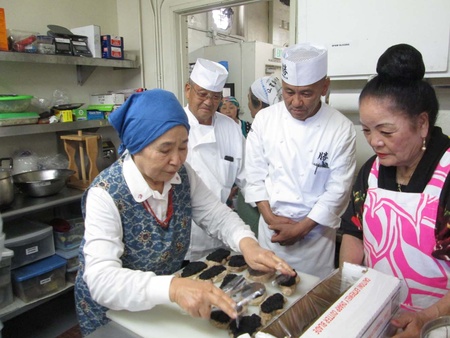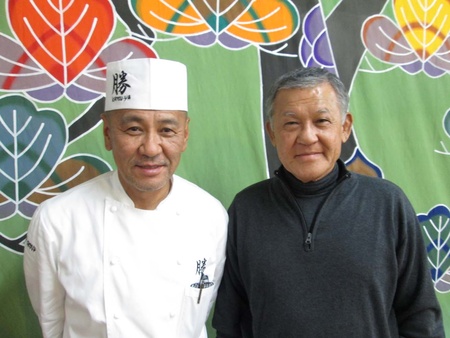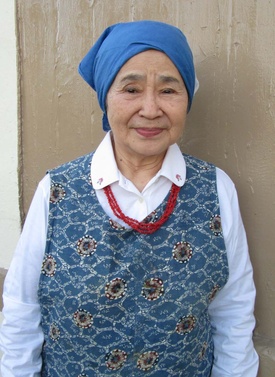When searching for "Yamamoto Ayaka" on the internet, one comes across various blogs about the cuisine at her restaurant in Naha. She is widely known as a chef who inherited the Ryukyu royal cuisine, and I had always wanted to visit her restaurant, but unfortunately in 2012 "Ryukyu Cuisine Yamamoto Ayaka" closed down. At that time, I was fortunate to have the opportunity to see Ayaka herself visit Los Angeles, where she gave a lecture and tasting event on cuisine at the Okinawa Prefectural Hall of North America. Furthermore, on this day, famous Okinawan chef Katsuya Uechi joined in with his staff to assist with the cooking. We asked Ayaka and Katsuya about what Ryukyu cuisine means to them, respectively.
Going back to basics and learning ~ Katsuya
Katsuya met Ayaka when he visited her restaurant through the introduction of Yoshihiro Toume, a former chairman of the Okinawans of North America Association. Katsuya remembers that this was about four or five years ago, so it was likely shortly before the restaurant closed.
"When I tasted the food, I was very impressed that, despite it being Ryukyu cuisine, it wasn't oily or heavy at all. The flavor was light and went down easy. I thought it was closer to the kind of Japanese food that people normally imagine."
Katsuya has been a chef for 38 years. He is a manager and entrepreneur who operates Japanese restaurants around the world with the Katsuya Group and partnerships. When asked if Katsuya, who has taken the industry by storm with his innovative ideas for Japanese food, has any plans to spread Ryukyu cuisine to America next, he surprisingly replied that it would be a high hurdle and difficult. "Without fear of being misunderstood, I'm not sure that Americans can understand the taste of Ryukyu cuisine." Katsuya believes that the taste buds of those who accept the cuisine are not keeping up.
On the other hand, when I asked him if he had any plans to open a restaurant in Okinawa, he said that in fact there had been talk of doing so many times in the past, but it had never come to fruition. "Okinawa is small, and the economic situation is not necessarily good. Prices are high, and the unemployment rate is high, so when we thought about it as a business, we decided that it would be difficult. Now the plan has disappeared."
He said that Ryukyu cuisine is difficult for Americans to understand, and conversely, Katsuya's innovative Japanese cuisine would be difficult to make as a business in Okinawa. Nevertheless, now that he is in the position of a manager and instructor and no longer on-site, when he heard that Ayaka was holding an event in Los Angeles, he volunteered to support her. "I don't usually have a chance to cook Ryukyu cuisine, so it was a very refreshing experience. I also enjoyed doing it. It felt like I was going back to my roots."
A mission to continue conveying - Ayaka
Ayaka held an event for the Okinawa Prefectural Association of North America on March 14th. Prior to the tasting and lecture, which was to start at 7:30pm, 10 members of the Okinawa Prefectural Association's Women's Division, Katsuya and his staff were gathered in the kitchen of the Okinawa Prefectural Association Hall from 2pm, surrounding Ayaka. As it was a rare opportunity to see a leading expert in Ryukyu cuisine at work, everyone paid close attention to Ayaka's movements and listened intently to everything she said, trying not to miss a single word. It turns out that after closing her restaurant, she is busy teaching people about Ryukyu cuisine.

"I will turn 81 on April 1st this year. Last year's medical checkup revealed nothing wrong with me. There's nothing wrong with me. A healthy body is built on what you eat on a daily basis. There's no doubt about that. I remember what I had for breakfast, and eat different things for lunch and dinner to maintain a balanced diet. I have never been hungry since I was a child, even during wartime. My adoptive mother was an expert cook. If we were given two cans of mackerel as rations, she would eat them as is the first time, and then add salt and leave them to sit. She would use them to make soup stock. I watched all of this as my mother did. Thanks to my mother's careful attention to what I ate from an early age, I have never had the flu, even at this age. I think it's because I have a good body."
Ayaka, who was also a dancer and instructor of Ryukyu dance, had been juggling cooking and dancing until she turned 50, but decided to focus solely on cooking. She says this was all due to a sense of crisis she felt that "if we don't share authentic Ryukyu cuisine with people, it will disappear."
So what is the difference between Japanese cuisine and Ryukyu cuisine? Ayaka was suddenly asked this question. When I was unable to answer, she said, "In Ryukyu cuisine, we never strain the ingredients, which is common in Japanese cuisine. In other words, the point is to get plenty of fiber without straining. Ryukyu cuisine is directly connected to health."
Ayaka's healthy and elegant cuisine has attracted many people, and fans from the mainland have come to her restaurant. She casually mentions the names of famous people who were regular customers.
During his stay in Los Angeles, he tried Californian Japanese food at Katsuya's restaurant. "I think he deliberately made the food light because I was tired after a series of flights to the US. Food needs to be seasoned differently depending on the person and the location. Children, who are physically active, and adults take in salt differently."
Unexpectedly, Katsuya said exactly the same thing. He said that cooking needs to be adjusted according to the person's physical condition and the climate of the place. Ryukyu cuisine seems to be more profound than we ordinary people think. Ayaka had a strong will to continue to convey the secrets of the cuisine to as many people as possible.
© 2016 Keiko Fukuda







